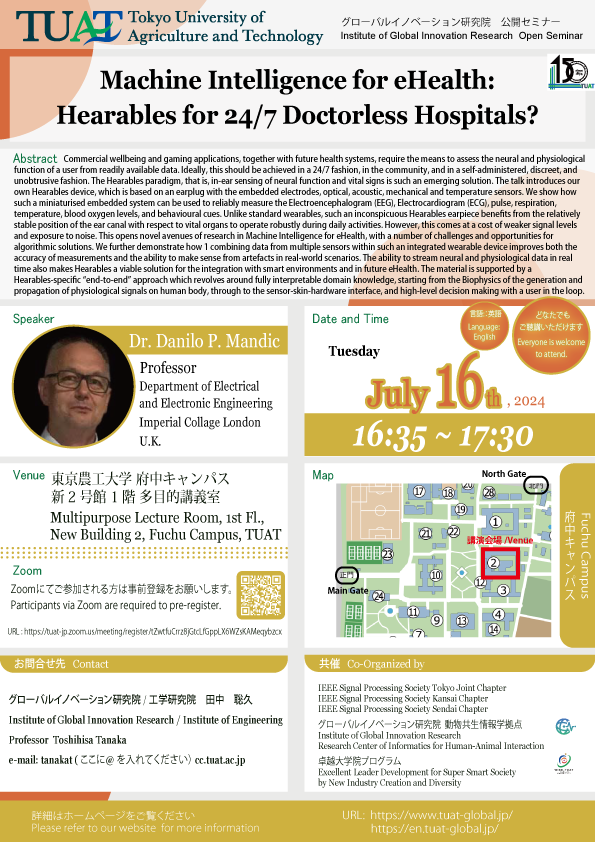Event
【GIR Open Seminar】 Dr. Danilo P. Mandic / Imperial Collage London (U.K.)

| Date | 2024.7.16 (16:35 - 17:30) |
|---|---|
| Venue |
Multipurpose Lecture Room, 1st Fl., New Building 2, Fuchu Campus, TUAT |
| Google Classroom Code | vacvebk |
| Speaker | Dr. Danilo P. Mandic |
| Affiliation | Imperial Collage London (U.K.) |
| Title | "Machine Intelligence for eHealth: Hearables for 24/7 Doctorless Hospitals? " <Abstract> Commercial wellbeing and gaming applications, together with future health systems, require the means to assess the neural and physiological function of a user from readily available data. Ideally, this should be achieved in a 24/7 fashion, in the community, and in a self-administered, discreet, and unobtrusive fashion. The Hearables paradigm, that is, in-ear sensing of neural function and vital signs is such an emerging solution. The talk introduces our own Hearables device, which is based on an earplug with the embedded electrodes, optical, acoustic, mechanical and temperature sensors. We show how such a miniaturised embedded system can be used to reliably measure the Electroencephalogram (EEG), Electrocardiogram (ECG), pulse, respiration, temperature, blood oxygen levels, and behavioural cues. Unlike standard wearables, such an inconspicuous Hearables earpiece benefits from the relatively stable position of the ear canal with respect to vital organs to operate robustly during daily activities. However, this comes at a cost of weaker signal levels and exposure to noise. This opens novel avenues of research in Machine Intelligence for eHealth, with a number of challenges and opportunities for algorithmic solutions. We further demonstrate how 1 combining data from multiple sensors within such an integrated wearable device improves both the accuracy of measurements and the ability to make sense from artefacts in real-world scenarios. The ability to stream neural and physiological data in real time also makes Hearables a viable solution for the integration with smart environments and in future eHealth. The material is supported by a Hearables-specific “end-to-end” approach which revolves around fully interpretable domain knowledge, starting from the Biophysics of the generation and propagation of physiological signals on human body, through to the sensor-skin-hardware interface, and high-level decision making with a user in the loop. |
| Language | English |
| Intended for | Everyone is welcome to join. |
| Co-Organized by | IEEE Signal Processing Society Tokyo Joint Chapter IEEE Signal Processing Society Kansai Chapter IEEE Signal Processing Society Sendai Chapter Institute of Global Innovation Research "Research Center of Informatics for Human-Animal Interaction" Excellent Leader Development for Super Smart Society by New Industry Creation and Diversity |
| Contact | Institute of Global Innovation Research, Institute of Engineering Prof. Toshihisa Tanaka Email: tanakat(at)cc.tuat.ac.jp |
| Remarks | *This seminar will be distributed on TUAT campus only.
Biography: Danilo P. Mandic is a Professor of Machine Intelligence with Imperial College London, UK, and has been working in the areas of machine intelligence, statistical signal processing, big data, data analytics on graphs, bioengineering, and financial modelling. He is a Fellow of the IEEE and the current President of the International Neural Networks Society (INNS). Dr Mandic is a Director of the Financial Machine Intelligence Lab at Imperial, and has more than 600 publications in international journals and conferences. He has published two research monographs on neural networks, entitled “Recurrent Neural Networks for Prediction”, Wiley 2001, and “Complex Valued Nonlinear Adaptive Filters: Noncircularity, Widely Linear and Neural models”, Wiley 2009 (both first books in their respective areas), and has co-edited books on Data Fusion (Springer 2008) and Neuro- and Bio Informatics (Springer 2012). He has also co-authored a two-volume research monograph on tensor networks for Big Data, entitled “Tensor Networks for Dimensionality Reduction and Large Scale Optimization” (Now Publishers, 2016 and 2017), and more recently a research monograph on Data Analytics on Graphs (Now Publishers, 2021). Dr Mandic is a 2019 recipient of the Dennis Gabor Award for “Outstanding Achievements in Neural Engineering”, given by the International Neural Networks Society. He is the 2023 Winner of The Prize Paper Award, given by the IEEE Engineering in Medicine and Biology Society for his Smart Helmet article, the 2018 winner of the Best Paper Award in IEEE Signal Processing Magazine for his article on tensor decompositions for signal processing applications, and the 2021 winner of the Outstanding Paper Award in the International Conference on Acoustics, Speech and Signal Processing (ICASSP) series of conferences. Dr Mandic served in various roles in the Word Congress on Computational Intelligence (WCCI) and International Joint Conference on Neural Networks (IJCNN) series of conferences, and as an Associate Editor for IEEE Transactions on Neural Networks and Learning Systems, IEEE Signal Processing Magazine and IEEE Transactions on Signal Processing. He has given more than 80 Keynote and Tutorial lectures in international conferences and was appointed by the World University Service (WUS), as a Visiting Lecturer within the Brain Gain Program (BGP), in 2015. Danilo is currently serving as a Distinguished Lecturer for the IEEE Computational Society and a Distinguished Lecturer for the IEEE Signal Processing Society. Dr Mandic is a 2014 recipient of President Award for Excellence in Postgraduate Supervision at Imperial College and holds six patents. |
このページの上部へ